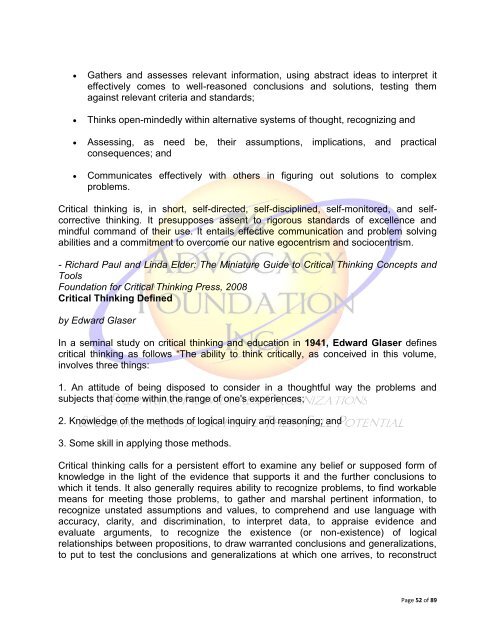The Nonprofit Incubator
The Nonprofit Incubator
The Nonprofit Incubator
You also want an ePaper? Increase the reach of your titles
YUMPU automatically turns print PDFs into web optimized ePapers that Google loves.
Gathers and assesses relevant information, using abstract ideas to interpret it<br />
effectively comes to well-reasoned conclusions and solutions, testing them<br />
against relevant criteria and standards;<br />
Thinks open-mindedly within alternative systems of thought, recognizing and<br />
Assessing, as need be, their assumptions, implications, and practical<br />
consequences; and<br />
Communicates effectively with others in figuring out solutions to complex<br />
problems.<br />
Critical thinking is, in short, self-directed, self-disciplined, self-monitored, and selfcorrective<br />
thinking. It presupposes assent to rigorous standards of excellence and<br />
mindful command of their use. It entails effective communication and problem solving<br />
abilities and a commitment to overcome our native egocentrism and sociocentrism.<br />
- Richard Paul and Linda Elder: <strong>The</strong> Miniature Guide to Critical Thinking Concepts and<br />
Tools<br />
Foundation for Critical Thinking Press, 2008<br />
Critical Thinking Defined<br />
by Edward Glaser<br />
In a seminal study on critical thinking and education in 1941, Edward Glaser defines<br />
critical thinking as follows “<strong>The</strong> ability to think critically, as conceived in this volume,<br />
involves three things:<br />
1. An attitude of being disposed to consider in a thoughtful way the problems and<br />
subjects that come within the range of one's experiences;<br />
2. Knowledge of the methods of logical inquiry and reasoning; and<br />
3. Some skill in applying those methods.<br />
Critical thinking calls for a persistent effort to examine any belief or supposed form of<br />
knowledge in the light of the evidence that supports it and the further conclusions to<br />
which it tends. It also generally requires ability to recognize problems, to find workable<br />
means for meeting those problems, to gather and marshal pertinent information, to<br />
recognize unstated assumptions and values, to comprehend and use language with<br />
accuracy, clarity, and discrimination, to interpret data, to appraise evidence and<br />
evaluate arguments, to recognize the existence (or non-existence) of logical<br />
relationships between propositions, to draw warranted conclusions and generalizations,<br />
to put to test the conclusions and generalizations at which one arrives, to reconstruct<br />
Page 52 of 89

















